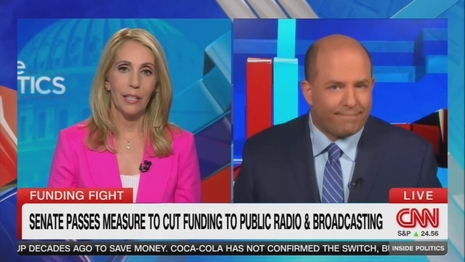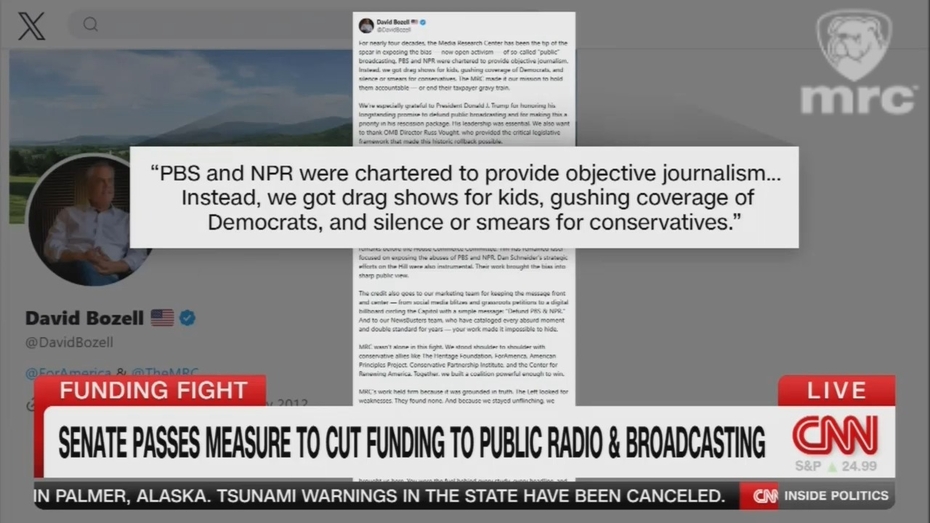 In a rare moment of journalism during CNN’s Inside Politics, on Thursday, chief media analyst Brian Stelter admitted that opponents of taxpayer dollars being funneled to NPR and PBS “do have a point” with some of their arguments. He even cited comments from MRC President David Bozell celebrating the Senate passing the rescission package striping the funding. Although, Stelter could have done some fact checking for the claims host Dana Bash and he were making.
In a rare moment of journalism during CNN’s Inside Politics, on Thursday, chief media analyst Brian Stelter admitted that opponents of taxpayer dollars being funneled to NPR and PBS “do have a point” with some of their arguments. He even cited comments from MRC President David Bozell celebrating the Senate passing the rescission package striping the funding. Although, Stelter could have done some fact checking for the claims host Dana Bash and he were making.
Stelter did admit that critics “do have a point” about the politics of NPR and PBS, and cited part of Bozell’s criticisms in an X post:
Well, like so much of our political discourse, it became nationalized and polarized. Like you said, conservative activists have been agitating for this outcome for 50 years. They’ve always wanted this money to be stripped away. But there was this support for localization of media that is now gone to the wayside because of arguments about national bias.
Look at David Bozell today. He’s the head of the Media Research Center, which has advocated for this cut to happen for decades, he says: “PBS and NPR were chartered to provide objective journalism ... Instead, we got drag shows for kids, gushing coverage of Democrats and silence or smears for conservatives.”
Bozell's full comments could be read here.
“While most of you were sound asleep at 2 a.m. Eastern standard time, Senate Republicans were busy trying to kick Big Bird out of the nest,” whined Bash at the top of the segment, pushing the big lie that Sesame Street would go away because of the cuts. “Senators voted to cut funding Congress already allocated, including for the Corporation for Public Broadcasting, which funds TV and radio stations across the country.”
After being brought on, Stelter did contradict Bash when noting: “Popular shows like Daniel Tiger’s Neighborhood and Sesame Street aren’t going to go away.” But he push the unfounded claims that, “As a result of this rescission, radio and TV stations will have to lay off staffers and cut back on programing…Smaller stations may go off the air entirely… there will be fewer local reporters in neighborhoods actually covering news.”
T. Becket Adams, program director for the National Journalism Center, took to X to confront such wild predictions. “NPR and PBS quit Twitter in 2023 after being labeled "government-funded media," arguing the funding they receive is so trivial as to render such a designation unfair and inaccurate,” he argued. “Now, we're told the potential loss of the allegedly trivial funding poses an existential threat.”
NewsBusters also debunked the myth that local programming would be significantly harmed by the funding cuts. Only 5.7 percent of NPR’s content in the 20 most rural states in America was local coverage. When that’s extrapolated to all 50 states, only 5.4 percent is local coverage.
“So, Big Bird is not going away, but the financial system that supported him for decades is going away and over time, what happens is the system becomes weaker,” Stelter went on to proclaim, omitting the fact that earlier this year Sesame Street inked a massive deal with Netflix. That’s not to mention the fact that the IP had two theme parks and was estimated to be worth upwards of $44 million.

Further, Bash leaned on the unsupported fears of Senator Lisa Murkowski that, without public broadcasting, emergency alerts would not get put out (Click “expand”):
And Republican Senator Lisa Murkowski, Brian, was one of the two Republicans who voted no. And she put on social media about what she called a tsunami warning issued in Alaska. It was a tsunami warning issued in Alaska, and it reached people through local public broadcasting.
Here’s what she said: “Some colleagues claim they are targeting radical leftist organizations with these cuts. But in Alaska, these are simply organizations dedicated to communities. Their response in today’s earthquake is a perfect example of the incredible public service these stations provide.” She went on to say, “they deliver local news, weather updates and, yes, emergency alerts that save human lives.”
This was a false argument. The package didn’t touch the Integrated Public Alert & Warning System and other radio stations can take over that responsibility with a contract with FEMA and DHS. That’s not to mention how the public radio station in Kerr County, Texas seemingly didn’t do their job in alerting the public to the Hill Country Flood.
For nearly four decades, the Media Research Center has been the tip of the spear in exposing the bias — now open activism — of so-called “public” broadcasting. PBS and NPR were chartered to provide objective journalism. Instead, we got drag shows for kids, gushing coverage of…
— David Bozell 🇺🇸 (@DavidBozell) July 17, 2025
The transcript is below. Click "expand" to read:
CNN’s Inside Politics
July 17, 2025
12:34:41 p.m. Eastern[ON-SCREEN HEADLINE: Senate Passes Measure to Cut Funding to Public Radio & Broadcasting]
DANA BASH: While most of you were sound asleep at 2 a.m. Eastern standard time, Senate Republicans were busy trying to kick Big Bird out of the nest. Senators voted to cut funding Congress already allocated, including for the Corporation for Public Broadcasting, which funds TV and radio stations across the country.
It is a win for President Trump, who has claimed NPR and PBS are biased and left leaning. And way before Donald Trump, Republicans have been trying to defund public broadcasting for more than 50 years. Even Mr. Rogers testified before Congress back in 1969.
[Cuts to video]
FRED ROGERS: What do you do with the mad that you feel when you feel so mad you could bite; when the whole wide world seems oh so wrong, and nothing you do seems very right?
[Cuts back to live]
BASH: CNN chief media analyst Brian Stelter joins me now. Brian. Okay. That was before both of our times. But we do know that that worked. And the lawmakers said Mr. Rogers, Fred Rogers, you can keep your funding. That’s not happening now.
BRIAN STELTER: No, this is the end of a publicly funded media era. This dates back to the days of black and white television. You know, back in the 60s, Congress saw a value for PBS and NPR, but no more.
As a result of this rescission, radio and TV stations will have to lay off staffers and cut back on programing. Some smaller stations will suffer more than bigger stations, right? Popular shows like Daniel Tiger’s Neighborhood and Sesame Street aren’t going to go away, but they may reach fewer people.
These big city stations in metro areas are going to have to rely more on viewer donations. Smaller stations may go off the air entirely. In fact, we’ve heard in the past few minutes from the head of the Corporation for Public Broadcasting who says, “Many of those stations will suffer and go off the air.”
And here’s what PBS CEO Paula Kerger said this morning, she said: “These cuts will significantly impact all of our stations, but will be especially devastating to smaller stations and those serving large rural areas.”
So, Big Bird is not going away, but the financial system that supported him for decades is going away and over time, what happens is the system becomes weaker. Without federal support, new shows won’t be developed, new local programing won’t happen, and there will be fewer local reporters in neighborhoods actually covering news.
So that’s the impact over time. It’s not going to happen right away, Dana, but over months and years, there will be a trickledown effect because of this, money is drying up.
BASH: And Republican Senator Lisa Murkowski, Brian, was one of the two Republicans who voted no. And she put on social media about what she called a tsunami warning issued in Alaska. It was a tsunami warning issued in Alaska, and it reached people through local public broadcasting.
Here’s what she said: “Some colleagues claim they are targeting radical leftist organizations with these cuts. But in Alaska, these are simply organizations dedicated to communities. Their response in today’s earthquake is a perfect example of the incredible public service these stations provide.” She went on to say, “they deliver local news, weather updates and, yes, emergency alerts that save human lives.”
As you kind of alluded to. Supporters of the funding cuts say that in the era of streaming, public stations aren’t needed for things even like what Murkowski is talking about. Who has the right point here?
STELTER: They do have a point to some degree. Look, the media world has changed radically since public broadcasting was created in the 60s. Back then, there was a bipartisan consensus that noncommercial TV and radio was a good thing. That kids shows should exist without ads. Think about Reading Rainbow and Sesame Street and Mr. Rogers. Congress defended this idea even when past Republican presidents tried to decrease the budget for PBS and NPR. Lawmakers said they liked the local programming back home.
So what changed? Well, like so much of our political discourse, it became nationalized and polarized. Like you said, conservative activists have been agitating for this outcome for 50 years. They’ve always wanted this money to be stripped away. But there was this support for localization of media that is now gone to the wayside because of arguments about national bias.
Look at David Bozell today. He’s the head of the Media Research Center, which has advocated for this cut to happen for decades, he says: “PBS and NPR were chartered to provide objective journalism ... Instead, we got drag shows for kids, gushing coverage of Democrats and silence or smears for conservatives.”
So, Republicans condemned perceived bias at the national level. Democrats decry local harms at the local level. They’re talking past each other, and the ultimate outcome is here. The money is going away, and we’re going to find out what the results are.
BASH: Yeah, it’s – we certainly are. And whether or not private donations are going to sustain these public broadcasting agencies or areas outside of the big cities, is the question that you pose and it’s going to be following it. I know you are for sure, Brian. Thank you so much. Appreciate you giving us that reporting.




